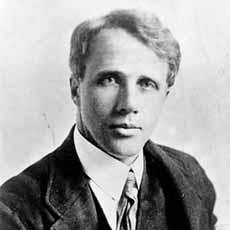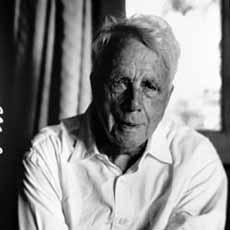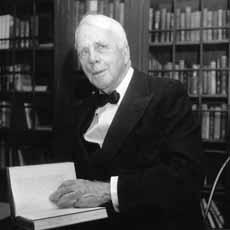
STEVE EMBER: I'm Steve Ember.
FAITH LAPIDUS: And I'm Faith Lapidus with PEOPLE IN AMERICA in VOA Special English. Today we finish the story of Robert Frost and his poetry.
STEVE EMBER: When Robert Frost left the United States in 1912 he was an unknown writer. When he returned from Britain three years later he was on his way to becoming one of America's most honored writers. Publishers who had rejected his books now competed against each other to publish them.
Unlike many poets of his time, Frost wrote in traditional forms. He said that not using them was like playing a game that had no rules. He joined the rules of the form with the naturalness of common speech. Other poets before him had tried to do this, but none with Frost's skill.
FAITH LAPIDUS: The common speech Frost used had the words and way of speaking that was clearly American. For example, a poem called "The Death of the Hired Man" begins:
ROBERT FROST:
Mary sat musing on the lamp-flame at the table,
Waiting for Warren. When she heard his step,
She ran on tiptoe down the darkened passage
To meet him in the doorway with the news
And put him on his guard. "Silas is back."
FAITH LAPIDUS: Frost is telling a story about an old farm worker named Silas. The discussion between Warren and Mary continues:
ROBERT FROST:
She pushed Warren outward with her through the door
And shut it after her. "Be kind," she said.
She took the market things from Warren's arms
And set them on the porch, then drew him down
To sit beside her on the wooden steps.
FAITH LAPIDUS: Warren says:
ROBERT FROST:
"When was I ever anything but kind to him?
But I'll not have the fellow back," he said.
"I told him so last haying, didn't I?
If he left then, I said, that ended it."
FAITH LAPIDUS: And Mary says:
ROBERT FROST:
"He's worn out. He's asleep beside the stove.
When I came up from Rowe's I found him here,
Huddled against the barndoor fast asleep. . . "

STEVE EMBER: Through the discussion between Warren and Mary the reader discovers more and more about Silas. In some ways he is a good worker, but he usually disappears when he is most needed. He does not earn much money. He has his own ideas about the way farm work should be done. And he has his own ideas about himself. Instead of asking for help from his rich brother, Silas has come to Warren and Mary. She says:
ROBERT FROST:
"... he has come home to die:
You needn't be afraid he'll leave you this time."
"Home," he mocked gently.
STEVE EMBER: She answers:
ROBERT FROST:
"Home is the place where, when you have to go there,
They have to take you in."
STEVE EMBER: Without ever having Silas speak, Frost has made the reader know this tired old man, who has come to die in the only home he has. In the final lines of the poem the story of Silas is completed. Mary says:
ROBERT FROST:
Warren returned -- too soon, it seemed to her --
Slipped to her side, caught up her hand and waited.
"Warren?" she questioned.
"Dead," was all he answered.
STEVE EMBER: The poem tells of the understanding that Mary and Warren have for a man who has worked for them for many years. The poem also presents a sadness that Frost repeats many times.
(MUSIC)
FAITH LAPIDUS: Robert Frost was like an earlier New England writer and thinker, Ralph Waldo Emerson. They never were good at joining others in programs or movements. Frost was politically conservative and avoided movements of the left or right. He did this not because he did not support their beliefs, but because they were group projects.
In the poem "Mending Wall" the speaker and his neighbor walk together along a wall, repairing the damage caused by winter weather:
SHIRLEY GRIFFITH:
Something there is that doesn't love a wall,
That sends the frozen-ground-swell under it
And spills the upper boulders in the sun,
And makes gaps even two can pass abreast...
No one has seen them made or heard them made,
But at spring mending-time we find them there.
I let my neighbor know beyond the hill;
And on a day we meet to walk the line
And set the wall between us once again.
We keep the wall between us as we go.
FAITH LAPIDUS: The speaker questions his neighbor who says: "Good fences make good neighbors. " The speaker says:
SHIRLEY GRIFFITH:
Before I built a wall I'd ask to know
What I was walling in or walling out,
And to whom I was like to give offense.

STEVE EMBER: Robert Frost's later poetry shows little change or development from his earlier writing. It confirms what he had established in such early books as "North of Boston." For example, a poem called "Birches," written in 1916 begins:
SHIRLEY GRIFFITH:
When I see birches bend to left and right
Across the lines of straighter darker trees,
I like to think some boy's been swinging them.
But swinging doesn't bend them down to stay
As ice storms do.
STEVE EMBER: And it ends:
SHIRLEY GRIFFITH:
I'd like to go by climbing a birch tree,
And climb black branches up a snow-white trunk
Toward heaven, till the tree could bear no more,
But dipped its top and set me down again.
That would be good both going and coming back.
One could do worse than be a swinger of birches.
(MUSIC)
FAITH LAPIDUS: In the nature poems there is often a comparison between what the poet sees and what he feels. It is what Frost in one poem calls the difference between "outer and inner weather." Under the common speech of the person saying the poem is a dark picture of the world. In "The Road Not Taken" he says:
SHIRLEY GRIFFITH:
Two roads diverged in a yellow wood,
And sorry I could not travel both
And be one traveler, long I stood
And looked down one as far as I could
To where it bent in the undergrowth;
Then took the other, as just as fair,
And having perhaps the better claim,
Because it was grassy and wanted wear;
Though as for that the passing there
Had worn them really about the same,
And both that morning equally lay
In leaves no step had trodden black.
Oh, I kept the first for another day!
Yet knowing how way leads on to way,
I doubted if I should ever come back.
I shall be telling this with a sigh
Somewhere ages and ages hence:
Two roads diverged in a wood, and I--
I took the one less traveled by,
And that has made all the difference.

STEVE EMBER: Among Frost's nature poems, there are more about winter than about any other season. Even the poems about spring, autumn, or summer remember winter. They are not poems about happiness found in nature. They are moments of resistance to time and its changes. And even the poems that tell stories are mainly pictures of people who are alone.
Frost shared with Emerson the idea that everybody was a separate individual, and that groups weakened individuals. But where Emerson and those who followed him looked at God and saw a creator, Frost saw what he says is "no expression, nothing to express." Frost sees the world as a "desert place. "
In a poem called "Desert Places," he says:
SHIRLEY GRIFFITH:
Snow falling and night falling fast, oh, fast
In a field I looked into going past,
And the ground almost covered smooth in snow,
But a few weeds and stubble showing last.
The woods around it have it--it is theirs.
All animals are smothered in their lairs.
I am too absent-spirited to count;
The loneliness includes me unawares.
And lonely as it is, that loneliness
Will be more lonely ere it will be less--
A blanker whiteness of benighted snow
With no expression, nothing to express.
They cannot scare me with their empty spaces
Between stars--on stars where no human race is.
I have it in me so much nearer home
To scare myself with my own desert places.
FAITH LAPIDUS: Robert Frost received almost every honor a writer could receive. He won the Pulitzer Prize for literature four times. In 1960, Congress honored Frost with a gold medal for what he had given to the culture of the United States.
In the last years of his life, Frost was no longer producing great poetry, but he represented the value of poetry in human life. He often taught, and he gave talks. Usually he would be asked to read his best known poem, "Stopping by Woods on a Snowy Evening:"
ROBERT FROST:
Whose woods these are I think I know.
His house is in the village though;
He will not see me stopping here
To watch his woods fill up with snow.
My little horse must think it queer
To stop without a farmhouse near
Between the woods and frozen lake
The darkest evening of the year.
He gives his harness bells a shake
To ask if there is some mistake.
The only other sound's the sweep
Of easy wind and downy flake.
The woods are lovely, dark and deep,
But I have promises to keep,
And miles to go before I sleep,
And miles to go before I sleep.
STEVE EMBER: Robert Frost died in 1963. He had lived for almost 100 years, and had covered many miles before he slept, many miles before he slept.
(MUSIC)
FAITH LAPIDUS: This program was written by Richard Thorman and produced by Dana Demange. The poetry reader was Shirley Griffith. I'm Faith Lapidus.
STEVE EMBER: And I'm Steve Ember. Our programs are online with transcripts and MP3 files at voaspecialenglish.com. And you can find us on Facebook and YouTube at VOA Learning English. Join us again next week for PEOPLE IN AMERICA in VOA Special English.
stubble: the lower short stiff part of the stems of crops such as wheat, etc. that are left in the ground after the top part has been cut and collected (作物收割后的)茬
Robert Frost, 1874-1963: celebrating national poetry month with one of America's most famous poets
A visit to poet Robert Frost's farm in Derry, New Hampshire
Servants enhanced work of renowned American poet
Lucille Clifton: the award-winning poet was the first African American poet laureate of Maryland
(来源:VOA 编辑:崔旭燕)
